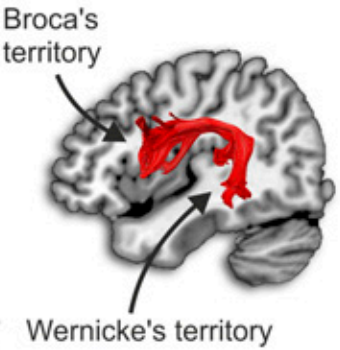A pathway in the brain that allows humans to learn new words
Might account for language disorders and differences between humans and non-human primates in language learning
July 25, 2013

The arcuate fasciculus (credit: Diana López-Barroso et al./PNAS)
Researchers from King’s College London Institute of Psychiatry, in collaboration with Bellvitge Biomedical Research Institute (IDIBELL) and the University of Barcelona, have mapped the neural pathways involved in word learning among humans.
They found that the arcuate fasciculus, a collection of nerve fibers connecting auditory regions at the temporal lobe with the motor area located at the frontal lobe in the left hemisphere of the brain, allows the “sound” of a word to be connected to the regions responsible for its articulation.
The average adult’s vocabulary consists of about 30,000 words. This ability seems unique to humans; the species closest to us — chimps — manage to learn no more than 100.
Differences in the development of these auditory-motor connections may explain differences in people’s ability to learn words. The results of the study are published in the journal Proceedings of the National Academy of Sciences (PNAS).
Dr. Marco Catani, co-author from King’s College London Institute of Psychiatry said: “This research sheds new light on the unique ability of humans to learn a language, as this pathway is not present in other species.
“The implications of our findings could be wide-ranging — from how language is taught in schools and rehabilitation from injury, to early detection of language disorders such as dyslexia. In addition these findings could have implications for other disorders where language is affected, such as autism and schizophrenia.”
No comments:
Post a Comment